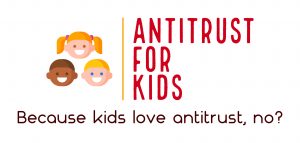Author: Molly Donovan
Antitrust for Kids is a new blog series designed to explain complex principles of U.S. competition law to practitioners and business people in plain English. Meant to be fun, and tongue-in-cheek, the series will serve as a useful primer to help the audience issue spot and better understand antitrust concepts like price discrimination, vertical restraints, tying, tacit agreements, and more.
Max and Margie are next-door neighbors on Lemon Lane. They both operate competing lemonade stands in their front yards all summer. And, both shop at the same grocery stores to purchase the same three ingredients necessary for making their finished drinks: fresh lemons, sugar, ice.
While they’ve been frenemies for years, casually exchanging pleasantries at times, this summer the weather is very hot, and so is competition in the local lemonade market. In fact, Max and Margie barely acknowledge each another, unless it’s to bad mouth the other—each complaining that the other makes inferior lemonade.
One day, Margie announces a breakthrough that she’s made in the lemonade space: STRAWBERRY LEMONADE. It’s a hit. Margie begins charging 2 times over cost for her strawberry drink, and the demand for plain old lemonade (sans strawberries) stops cold.
Max is incensed, naturally, and hatches a scheme to bring Margie down.
Max heads to the largest grocery store in town. There, he tells George (the grocer) that unless George stops selling lemons, sugar and ice to Margie, Max—and more importantly, Max’s dad—will pull all their business from George immediately. EEEK! That would be a real problem for George because Max’s dad buys nearly all his ingredients to operate the town’s most popular restaurant from George, which is a serious portion of George’s business.
George feels he has no choice. He agrees with Max to stop selling lemons, sugar and ice to Margie.
[“Oh no,” thinks the antitrust lawyer, “that’s a vertical agreement, i.e., an agreement between a purchaser and a supplier, to restrain competition for the purchase of lemonade ingredients.”]
“But,” says George, “I don’t want to see all of my business with Margie go to the other grocers in town. Hear what I’m saying?” “Good idea,” thinks Max.
Max promptly visits the two other grocers in town, telling them that they’d better not sell lemonade ingredients to Margie, or else Max will boycott and so will his dad, both of whom provide a steady stream of business to these grocers as well (whenever George faces supply issues). Max takes care to add: George already agreed, so all of you grocers need to get on the same page.”
Not sure what else to do, these two additional grocers respectively agree to Max’s proposal. While the idea seems contrary to their individual interests, they can see Max means business and independently decide it’s easiest to comply.
Max circles back with George, telling him that all the grocers in town are on board. George nods.
[“Oh no,” thinks the antitrust lawyer, “now there’s a potential horizontal agreement, i.e., an agreement among competitors in the same level on the supply chain—in this case, the 3 grocers. Such an agreement could be implied even though the grocers never actually spoke to one another.”]
As a result of Max’s scheming, Margie can’t buy the ingredients she needs, and goes out of business. Max never can figure out how to add strawberries to his classic recipe for straight lemonade, so the town is left without strawberry lemonade indefinitely.
Margie’s very upset until she meets an antitrust lawyer to whom she tells her story. The antitrust lawyer explains to Margie that she’s the victim of a hub-and-spoke conspiracy—with Max at the hub, 3 separate vertical agreements between Max and each of the grocers (the spokes), and the 3 grocers all implicitly agreeing with one another, forming a horizontal agreement to boycott Margie on the “rim.” While courts may analyze the arrangement differently depending on the jurisdiction, it’s certainly an antitrust concern anywhere.
With her lawyer’s help, Margie files an antitrust claim, wins trebled damages, and lives happily ever after selling her strawberry lemonade, now world famous.
Max becomes a white-collar lawyer specializing in the defense of executives who allegedly violate the criminal antitrust laws. He’s still single.
THE MORALS OF THE STORY:
*For the Max types: I wish you would have talked to counsel before asking a counterparty to agree with you to stop doing business with your rival in order to put her out of business. As you now know, such behavior carries serious risks.
*For the grocer types: It can be risky to suddenly change your course of dealings with one counterparty at the urging of another counterparty. And if put in that situation, definitely do not seek assurances that you and your competitors are all going to do the same thing or “be on the same page.”
*For the Margie types: If you’re being boycotted by your suppliers or your distributors, you *might* have an antitrust claim with potential trebled damages.
 The Antitrust Attorney Blog
The Antitrust Attorney Blog



